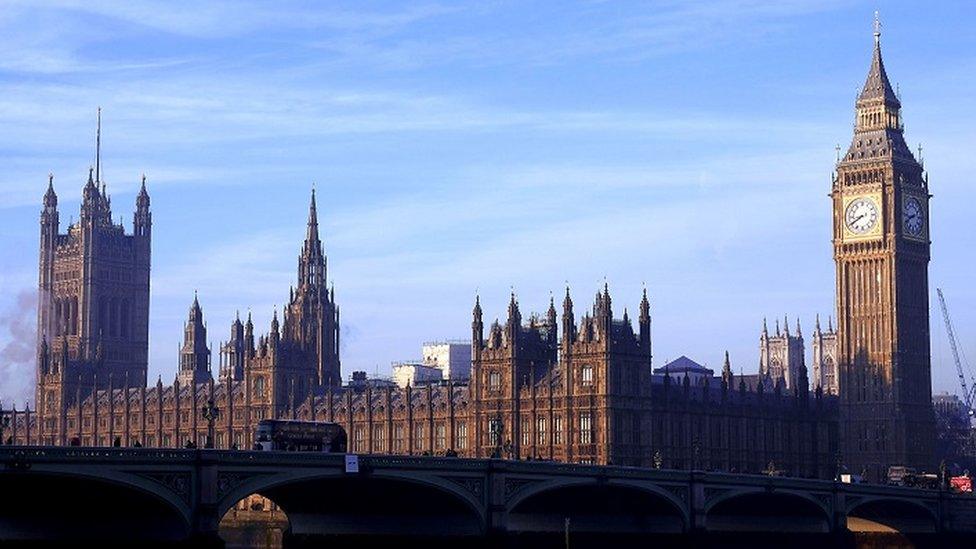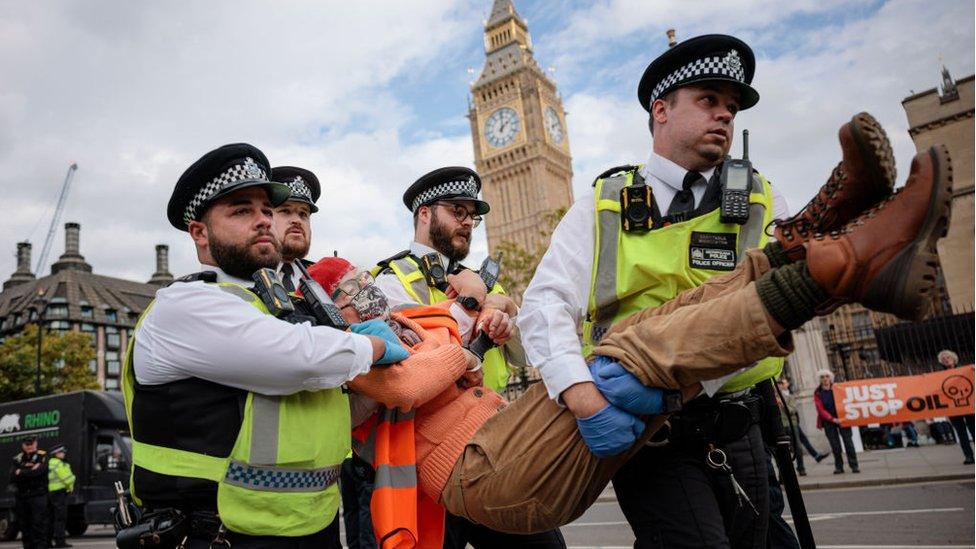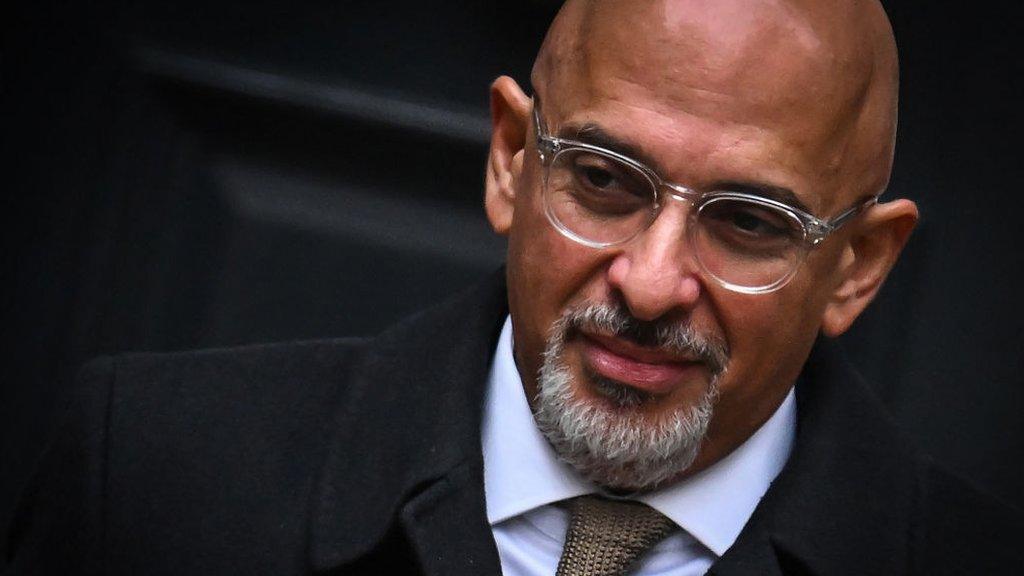What's happening in Parliament next week?
- Published

The political pot should be simmering nicely in Westminster next week.
The questions about Conservative Party Chair Nadim Zahawi continue to reverberate, and some contentious legislation up for debate in both houses.
The Strikes Bill will get a hearing in the Commons and the Public Order Bill and the Online Safety Bill in the Lords.
And with an Opposition Day on Tuesday, Labour will doubtless seek to turn up the heat still further.
Meanwhile quite a queue of heavy-duty legislation is building up in the Lords. Long debates are expected on the detail of the Levelling Up Bill, the Strikes Bill, the Financial Services Bill, the Economic Crime Bill and the Online Safety Bill, to name but a few.
They will provide a major test for the new Conservative leadership team in the Lords - with Lord True as leader and Lady Williams as chief whip. They're beginning to win more votes. Partly out of smarter whipping and partly because waves of new peerages have gradually tilted the balance of the house the government's way.
The team comfortably saw off opposition amendments to the Genetic Technology (Precision Breeding) Bill, this week, which may be a sign of things to come in the exquisitely panelled division lobbies of their lordships' house.
Monday 30 January
Commons: Defence Questions starts at 14:30. Look out for the usual post weekend statements and urgent questions from 15:30. Likely subjects include the decision to drop plans to set up a migrants commissioner as recommended by the Windrush Inquiry.
The main event will be five hours of detailed debate on the Strikes (Minimum Service Levels) Bill. Labour is pushing a series of amendments designed to ensure the bill does not erode protection from unfair dismissal, and to require a detailed impact assessment to be published.
They're also focussing on the role the Bill gives ministers in setting minimum service levels during strikes. Labour has amendments down to require consultation and a role for parliament in agreeing what the service levels should be.
Westminster Hall: From 14:30 there is a debate on e-petition 604472 which calls for the government to reduce the fee charged for granting indefinite leave to remain to foreign workers from the current £2389 to £243, for NHS workers.
Committees: From 16:00 the Levelling-Up Housing and Communities Committee questions London Mayor Sadiq Khan. Expect questions on how the levelling-up process is funded and whether resources are directed to those areas most in need.
Lords: After questions at 14:30 the highly controversial Public Order Bill reaches its Report Stage. This is the point at which there are serious attempts to rewrite it.
There is only supposed to be one day for report, but with six or more votes likely, an extra day - probably on 7 February - looks pretty certain.

Contentious issues include policing arrangements around abortion clinics. There are competing amendments seeking to define precisely what constitutes "serious disruption" for the purposes of the bill.
The government is rumoured to be supporting the one from the former deputy Supreme Court president, Lord Hope of Craighead which would define it as activity that "prevents or would hinder to more than a minor degree the individuals or the organisation from carrying out their daily activities."
There is also a regret motion from Labour Baroness Hayman on the Environmental Targets (Particulate Matter) (England) Regulations. She's arguing that the government has not pushed hard enough to reduce air pollution and that it should produce a more ambitious strategy. The motion is not expected to be pushed to a vote.
Tuesday 31 January
Commons: At 11:30 there is Foreign Office Questions.
Ten Minute Rule Bill from Labour's Geraint Davies wants minimum air quality standards.
There's also a rather cheeky presentation bill from Labour Veteran Barry Sheerman, to make the failure to wear a car seatbelt an endorsable offence... could he be thinking of anyone in particular?
The main debate will be on Labour motions that have yet to be announced.
Westminster Hall: At 09:30 Tory veteran Peter Aldous has a debate on the progress towards the government's levelling-up plans in the East of England .
Conservative Cherilyn Mackrory has a debate on sentencing for violence against women and girls from 14:30.
Committees: It is a busy day for Health and Social Care Committee with two major evidence sessions.
First they question the head of the NHS Pay Review Body, Philippa Hird at 10:00. Then Health Secretary Steve Barclay will be quizzed on the pressures facing the NHS in his debut before the committee from 16:00.
Lords: From 14:30 it is the second day of detailed debate on the Northern Ireland Troubles (Legacy and Reconciliation) Bill.
Wednesday 1 February
Commons: At 11:30 questions to the Attorney General, followed, at noon, by Prime Minister's Question Time.
The it is a Ten Minute Rule Bill from the Alba Party's Neil Hanvey to give the Scottish Parliament the right to hold a further independence referendum.
The main debate will be on the detail of the UK Infrastructure Bank Bill.
It should be reasonably uncontroversial, which may not be unconnected to the fact that most Conservatives will be attending the centenary bash for the 1922 Committee when it is on. Confusingly the Tory MPs' backbench trade union was actually founded in 1923, by MPs elected the previous year.
Committees: The Northern Ireland Committee meet at 09:30 to continue its look at paramilitary groups' coercive control of communities. They will hear from Troubles victims and survivors' representatives.
Lords: At 15:00 the main event is the Second Reading debate on the Online Safety Bill. Expect plenty of markers to go down, for attempts to rewrite the detail in later debates.
Thursday 2 February
Commons: At 09:30 we have Cabinet Office questions, followed by the announcement of the following week's Commons agenda.
The main debates are on backbench motions on LGBT history month and on 25 years of devolution in Wales.
Committees: From 09:30 the Public Accounts Committee quizzes the top officials of the Lords and Commons, Simon Burton the Clerk of the Parliaments, and John Benger the Clerk of the Commons.
They will be asked how the newly created Restoration and Renewal Client Body will tackle the multi-billion pound revamping of Parliament's crumbling Victorian home. The duo endured a rough ride on the previous appearance.
Bring popcorn.
Lords: At 11:00 there will be debates on a series of reports by Lords select committees.
Friday 3 February
Commons: From 09:30 three bills proposed by individual MPs on employment rights issues are back for debate in detail.
First, the Labour MP Dan Jarvis's Protection from Redundancy (pregnancy and Family Leave) Bill. Then the Lib Dem Wendy Chamberlain's Carers Leave Bill, and third the Lib Dem Wera Hobhouse's Worker Protection (Amendment of the Equality Act) Bill.
All three have been backed by the government, which has used the Private Members Bill system (bills proposed by individual MPs, rather than by ministers) to push through what amounts to a kind of self-assembly Employment Bill. This is in the absence of long-promised full-scale update on employment law.
Lords: From 10:00 debates will start on new laws proposed by individual peers, starting with the Second Reading of Lord Udny-Lister's Mobile Homes (Pitch Fees) Bill. The bill changes the uprating for pitch fees for mobile homes from the Retail Price Index measure of inflation to the Consumer Price Index, which tends to register lower increases.
Next is campaigner Baroness Finlay of Llandaff Ofcom (Duty Regarding Prevention of Serious Self-harm and Suicide) Bill. This would require Ofcom to establish a unit to advise the government on the extent of content on social media platforms which could be seen to encourage self-harm or suicide.
That's followed by the Water Safety (Curriculum) Bill. This would require compulsory water safety education at all schools in England and Wales. Then its the Education (Non-religious Philosophical Convictions) Bill. This aims to include non-religious philosophical convictions within the school curriculum.
Related topics
- Published25 January 2023

